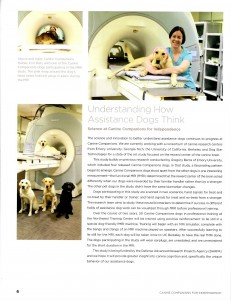Research conducted by Dog Star Technologies, a canine neuroscience company co-founded by CPT’s Mark Spivak, was featured in the Spring 2015 issue of the Canine Companions for Independence (CCI) magazine, “The Companion.” The article, entitled “Understanding How Assistance Dogs Think- Science at Canine Companions for Independence,” discusses bi-coastal research funded by the Defense Advanced Research Projects Agency (DARPA) and conducted by Dog Star Technologies and Dog Star’s subcontractors Emory University, Georgia Tech University’s entrepreneurial research arm- the Georgia Tech Research Corporation (GTRC), and the University of California, Berkeley.
The project entails a two-year seven figure Small Business Technology Transfer (STTR) contract awarded to Dog Star, whereby Dog Star designs the research and then operates the research in collaboration with the listed university subcontractors. The research is based upon a prior study completed for the Office of Naval Research (ONR) by CPT’s Mark Spivak, Emory Professor Gregory Berns, and Emory Postdoc Andrew Brooks published in PLOS One and covered nationally and internationally in the media, including the BBC and PBS series Nova and the CBS news documentary 60 Minutes. Mark and Greg co-founded Dog Star and work on the project. Mark is Dog Star’s Chief Operating Officer, Greg is Dog Star’s Chief Scientist, and Andrew is Dog Star’s Project Scientist.
Emory University provides local support services. The Georgia Tech Research Corporation is developing mobile and stationary pneumatic and motion sensor products that in conjunction with Dog Star’s fMRI protocols are aiming to achieve the project’s objective of creating a scientific protocol for better identifying optimal service dog candidates. The University of California, Berkeley provides west coast MRI services within their Li Ka Shing Center for Biomedical and Health Sciences.

Each quarter the Dog Star team and their Georgia Tech colleagues travel to CCI’s Santa Rosa, CA headquarters to test a cohort of dogs on the mobile and stationary sensors. They then travel to Berkeley to test the dogs in Berkeley’s 3T Siemens MRI. After testing a total of 50 dogs, Dog Star will author a report to DARPA and then commercialize relevant findings and products that emanate from the research.
Said Mark, “The Dog Star’s research has the potential to vastly improve the delivery of service dogs to disabled veterans and civilians. We appreciate DARPA’s interest in the project and CCI’s cooperation in providing us a sample base of quality dogs. From DARPA’s perspective, the US government has a vested interest in more productively allocating funds destined to benefit warriors wounded physically and/or psychologically. Service dogs provide great physical and emotional benefit to veterans and can reduce the long-term VA health costs for those veterans that receive quality dogs, which benefits all US taxpayers. From CCI’s standpoint, by more effectively determining high and low potential candidates earlier in the puppy raising or training process, CCI can more economically allocate donor contributions and produce an output of more dogs that benefit more veterans and civilians. This is a wonderful project that evokes great passion from all the participants. Plus, I enjoy visiting the Bay Area 4 times a year, as I enjoyed attending graduate school at Berkeley and living in the area during the time I worked in Silicon Valley.”
For more information about Dog Star Technologies, please review the Dog Star website. For more information on the team’s research, please review the CPT News and CPT Tails section of the CPT website and the CPT Facebook Page.
(Santa Rosa, CA)
(Berkeley, CA)
(Sandy Springs, GA)
(Atlanta, GA)
(Decatur, GA)